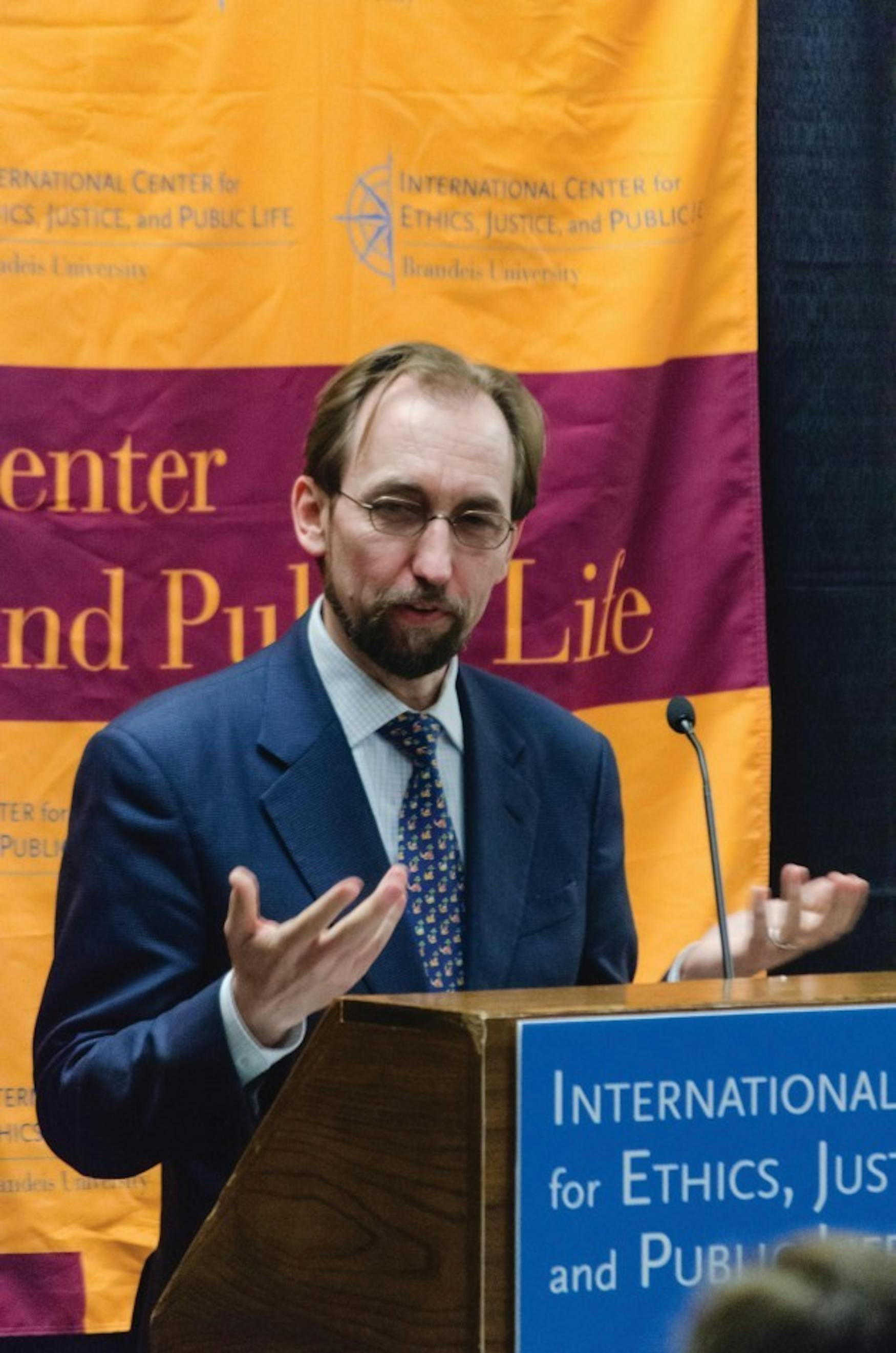Prince speaks on war and crimes
Last Wednesday, Prince Zeid Ra'ad Zeid al-Hussein, permanent representative of the Hashemite Kingdom of Jordan to the United Nations, addressed a full audience of students, faculty and guests in the International Lounge in a presentation titled "Beyond Nuremberg: The Future of International Criminal Justice" in which he discussed the role of humanity and remorse in war crimes.
The presentation was the second-annual Distinguished Lecture in International Justice and Human Rights sponsored by the International Center for Ethics, Justice and Public Life. The event was co-sponsored by the International and Global Studies Program, the Legal Studies Program and the Coexistence and Conflict Graduate Programs at the Heller School for Social Policy and Management.
Donald Ferencz, director of the Planethood Foundation, acted as a moderator at the event. According to the Conference on International Justice's website, the Planethood Foundation, which funded the Distinguished Lecture program, provides grants "primarily focused on issues pertaining to the International Criminal Court and efforts at educating to replace the law of force with the force of law." Other Planethood Foundation grant recipients have included organizations such as Americans for Informed Democracy and Citizens for Global Solutions, according to the Conference's website.
University President Frederick Lawrence introduced the event, stating that it is our "sacred mission" to leave the world "a little better than we found it," and that he was confident Zeid's lecture would touch upon the "elusive but vitally important solutions" to the complex issue of war atrocities.
Zeid began his presentation with accounts of his time in sites of previous genocides and other atrocities. On visiting these sites decades after the fact, he said, "No matter how brilliant our achievements, whether artistic, scientific or technical, we still live in Albert Camus' age of murder where, with shameful frequency, the evil and horrors some are capable of inflicting on many others would test severely our hopes for and belief in humankind."
According to its website, the International Criminal Court was founded in 2002 and is an independent international organization separate from the United Nations system. The very creation of the ICC, said Zeid, was "a miracle, really, given the realities of political inertia and the considerable opposition that once weighed against its creation," including opposition from the administration of former President George W. Bush. But the ICC, he added, is "a court conceived not by governments but by individuals who so happened to represent those governments."
"We built an international criminal court of this sort for the victims because it is they and their kin who ultimately will decide whether a society will ever recover from the brutality of war," he said.
However, he added, he questions aspects of this criminal justice system that "offers little more than dressed-up retribution."
"Should we not aspire to something even greater, deeper, than merely punishing the guilty?" he asked.
What an international criminal justice system should seek instead, he said, is "some acknowledgement on the part of the perpetrator that their conduct was malicious, profoundly wrong-wicked, even." This "genuine recognition of wrongdoing" would "elevate the victim whose life at the moment of the crime meant nothing to the killer back to being of some value, worth something," he continued.
War crimes and the criminals who commit them are linked strongly to circumstance and "the value we connect to it on how we perceive conduct and morality," said Zeid.
"Most war criminals are not born with a desire to murder," he continued. "They are normal people who kill because in the strange cocktails of circumstances that can arise, fed by specific aspects of human evolutionary psychology, they feel they have no choice ... but to obey thoughtlessly, reluctantly."
Could the ICC, Zeid inquired, ever overturn the worldview that contributes to this situation? "The world becomes a kaleidoscope of relative impression," he said, in which individuals justify their own actions and view those of enemies as wrong and in which "we classify people easily, almost without knowing it."
"Produce that most unusual mixture [of] conditioning and conditions, and many, if not most of us, here would be capable of criminal conduct we could only qualify as barbaric," he said.
Zeid proposed the incorporation of human rights into education as a primary element of the solution.
"Children would have to know what bigotry and chauvinism are [and] that blind allegiance can be dangerous when exploited for nefarious ends by authoritative figures," he said.
"They should also not feel exceptional because of where they were born, how they look, what passport they carry or when they've been taught to believe ideologically."
In the question-and-answer session following the lecture, a student asked about Zeid's position as nobility and how it relates to his work in criminal justice. "I'm proud of where I'm from, but it doesn't make me exceptional," he replied, linking his response to his discussion of education reform and the evasion of the classification of oneself that can lead to extremism.
"We work for our people, and we have to listen to them very carefully," he said.



Please note All comments are eligible for publication in The Justice.